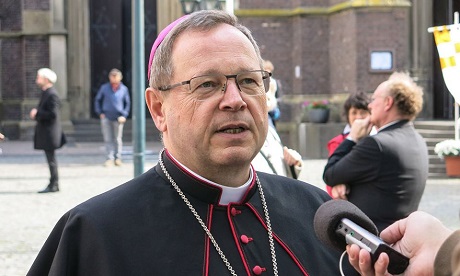Voluntary celibacy or marriage – the call for priests to be able to choose which state they prefer is growing stronger in Germany.
German bishops’ conference president Bishop Georg Bätzing (pictured) and Archbishop Ludwig Schick have added their support to Cardinal Reinhard Marx who spoke strongly in favour of voluntary celibacy at the beginning of February.
Schick is advocating ordaining ‘viri probati’ – “men who are tried and tested in marriage” while also giving increased support to priests who choose to remain celibate.
He wrote in the German daily Fuldaer Zeitung that a good mixture of married and celibate priests could prevent clericalism and abuse of power.
The requirement that most priests in the Latin rite of the Catholic Church be celibate has theological and spiritual foundations and not only practical motivations, an international conference on priesthood was told on Monday.
Canon lawyer Gianfranco Ghirlanda SJ said the church has never claimed that celibacy is ‘intrinsic’ to the priesthood.
He noted the Eastern catholic churches have maintained the discipline of having both celibate and married clergy, and the Latin church has welcomed married priests coming from other denominations.
Celibacy “is not a divine law, because otherwise the discipline of the Eastern churches would not be possible, and it would not have been possible to have married priests in the early church, even if they were called to continence” he said.
A married priesthood “is not a second-class priesthood,” because married priests also proclaim the Gospel, lead the Christian people and celebrate the sacraments, Ghirlanda explained.
Celibacy or marriage “does not touch the priesthood in itself”.
In the Code of Canon Law for the Latin church, celibacy is seen as a gift from God that enables priests “to adhere more easily to Christ with an undivided heart and dedicate themselves more easily to the service of God and his people” he said.
Catholic theology, spirituality and church law on priesthood aim to promote a ‘self-giving love’.
In this, celibacy is not lived “in a repressive way as mortification and denial” but as an expression of the biblical call to a “purity of heart”.
Another speaker, Father Emilio Justo who is a professor of theology, agrees with Ghirlanda.
In the first millennium, married priests were common, he said.
He believes however, there were “predominant tendencies” favouring celibacy and requiring married priests to forgo sexual relations with their wives.
The requirement to live marriage in this ‘abnormal way’ was primarily theological, he said, and was based on a priest’s role as mediator between God and the faithful, a role that required ‘purity’.
This is not a ritual purity, ‘but it is related to holiness’ and conformity to Christ, who offered his whole self to God for the salvation of the world, he said.
It is a call to communion: “The church is the space where the ordained minister loves and is loved”.
Source
